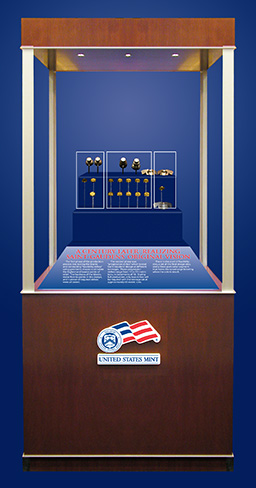
Case 3: The Strikes
A CENTURY LATER:
REALIZING SAINT-GAUDENS’ ORIGINAL VISION
The first phase of the production process was testing the blanks and conducting “feasibility strikes” using geometric shapes to simulate the highest and lowest points of relief. The hardness of the blanks, metal flow to points in the design, and number of required strikes were all tested.
The second phase was “progression strikes” which tested Saint-Gaudens’ design at different tonnages. These progression strikes range from 15 to 55 metric tons, in increments of 10. During full production, only two strikes will be required with the tonnage set at approximately 65 metric tons.
There is also a set of feasibility dies, a set of the final design dies, and a three-part collar segment that forms the raised edge lettering when the coin is struck.
Click on the items in the case for a close-up image.
